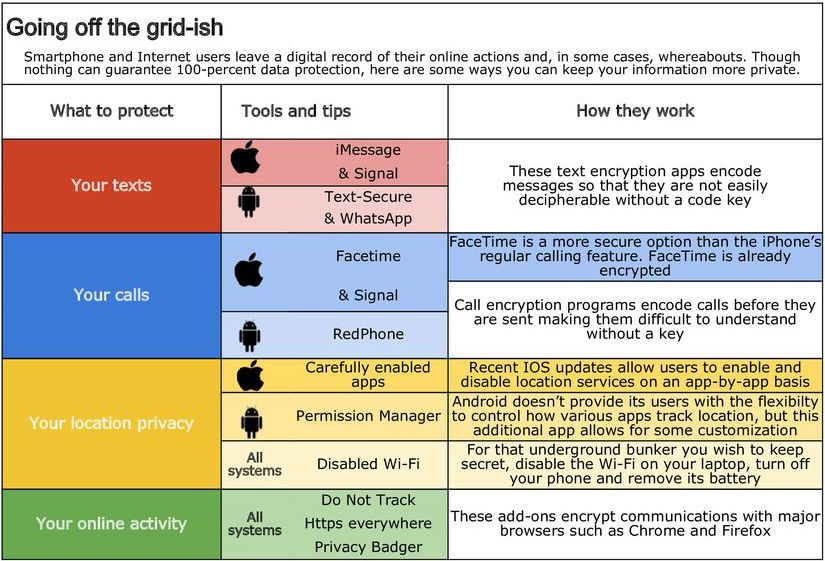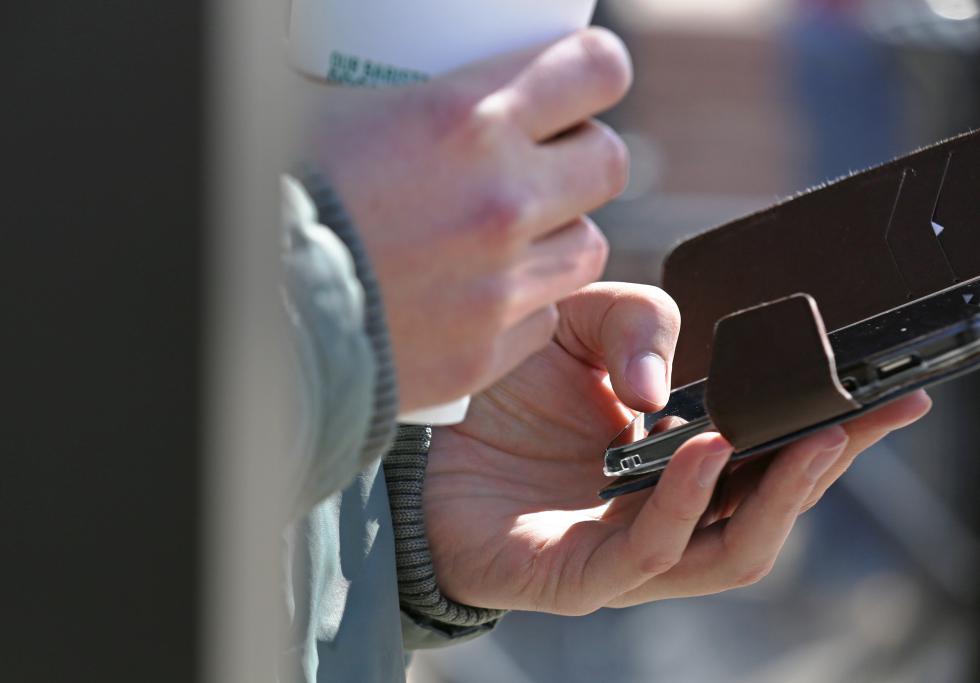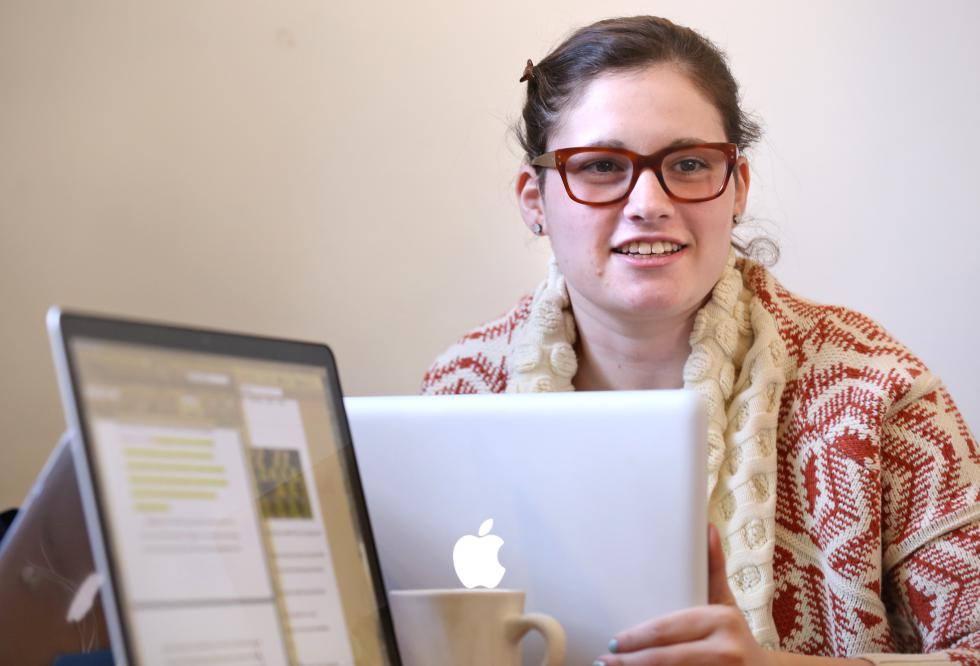Pandora has gotten a little too intuitive.
Recently, I was running at the gym, earbuds in, Pandora streaming Kelly Clarkson’s upbeat “What doesn’t kill you makes you stronger,” when the song was interrupted by an ad inviting me to become a certified personal trainer. That was followed by a series of songs about running, sweating, and working it. I began to suspect Pandora might know just where I am. Is Pandora spying on me?
It’s unsettling to think of Pandora, its advertisers and Apple, by extension, as co-conspirators in a plot to match my daily activities with corresponding ads, but Seth Schoen, senior technologist with the Electronic Frontier Foundation, says that’s entirely possible.
“I don’t know of any particular company that is doing it today, but I believe that the companies have the motive, means, and opportunity to do it in the future,” Schoen says.
That motive is geographically targeted advertising, the ability for a company to tailor an ad to where you are and what you’re doing, then get that promotion right in your hand by way of a smartphone. And it’s already in full swing. Think of all those location-based ads that pop up while surfing the Internet and how Facebook seems to always know your shopping habits. Schoen says many companies have their sights on more location specificity.
National Security Agency whistle-blower Ed Snowden released a torrent of technological revelation about how the mobile communications and emails of millions of people, everyone from regular Americans to international leaders, are being recorded, stored, and often monitored by the NSA. Since Snowden, there’s been a heightened awareness of the immense amount of information that’s available for the taking.
Smartphone apps have to be enabled to access location, contacts, and camera data, but permissions are often lumped together and functionality seems to trump privacy for many people. A smartphone monitors location, calls, and texts, revealing associates and daily patterns. Emails, Internet searches, and credit card purchases — all that information is stored by various apps, software companies, retailers, social media platforms, you name it. And it’s accessible to just about anyone who wants it, either through a government request, subpoena or warrant, sale to a marketing firm, or hacker.

Data collecting
Bill Newman, director of the Western Massachusetts Legal Office of the American Civil Liberties Union, says it is surprisingly easy for the government to gain access to our information.
“If all that information is available somewhere, then the government can put its hands on it,” Newman says.
According to a USA Today story from June 2014, Colorado police obtained court orders and gained access to at least several thousand people’s phone records in attempts to locate a missing 10-year-old girl. The access did not solve the crime, according to the article, as police were tipped of via traditional means by the murderer’s mother. The data sweep did aid in the prosecution, however, as the 17-year-old murderer was sentenced to 100 years in prison.
President Barack Obama’s administration claims to only collect metadata — a somewhat murky term referring to the data surrounding communications, but decidedly not the actual content of a telephone call — but Newman says metadata adds up. Newman says call patterns, online movements, and purchases when paired with the often available information through online social networks, paints a complete picture of an individual — your day-to-day activities, your choices and your family and friends.
“When you think about all of the data that we make readily available to the government; it’s really quite frightening,” says Newman. “You consolidate all this information and the government can compose a composite picture.”
But public concern over the data being collected on smartphone and Internet users isn’t high.
“It’s kind of scary, but it’s not something I’m concerned about,” says Amir Tofighi, 23, who sits across from his girlfriend at Rao’s in Amherst. “It doesn’t affect my life much.”
“If I’m bothered, I shouldn’t be using Facebook,” says Gabe Gonzalez, 22, a student at Amherst College who was having coffee at Rao’s in Amherst with two classmates. He has his laptop out as he explains he’s not surprised that his online activity is tracked.
“The Internet just isn’t private property anymore — so if you use it you have to be okay with that,” agrees his friend Kate Sundheim, 22.
“It’s kind of the nature of the beast,” Gonzalez says.
Classmate Laura Girrard, who sits in between Gonzalez and Sundheim, says she isn’t concerned about how her online activities are being recorded now, but perhaps when she’s older she may think otherwise. “I’m a student, but if I had a job where protecting people was important, I might feel differently.”
Yael Ben-Chaim, 21, of Amherst says she was forced to think more carefully about how traceable she is after realizing she had a stalker last semester, referring to the ordeal as terribly “weird.”
Justin Guaytanof, 14, of Amherst waits for a bus in downtown Amherst. He says he doesn’t often consider his vulnerability to unwelcome eyes and ears, but some Facebook fine print requesting access to his on-board camera and microphone recently made him uneasy. “If you give them access, it means they can pretty much do whatever they want,” he says.
As Kastis Gourgoulias waits for the arrival of his bus, he says he extends extra effort to prevent his mobile apps from accessing information they don’t need. He says he’s downloaded Permission Manager on his Android phone which allows him to customize the liberties his apps take with his information. “It takes time so most people don’t,” Gourgoulias says.
Corporate responsibility
Last winter, Chris Soghoian, principal technologist with the Speech, Privacy and Technology Project at the ACLU, urged large tech companies to make their devices more secure for consumers. With Apple leading the way, big tech has heard the call and made steady progress, which Soghoian tracks on his blog.
Emery Berger, computer science professor at UMass Amherst, says Apple is in a better position to enhance security on their devices, as they make luxury goods and the demand is there.
Encryption is a big one — new programs are emerging which allow you to encrypt your calls, texts, emails, and even browser activity. Berger says Open Whisper Systems is an increasingly popular set of programs to stymie this kind of tracking. For iPhones, iMessage is a more secure way to text, and so is What’sApp for Android phones. Signal and RedPhones are the leading call encryption softwares for iPhones and Android phones, respectively.
Berger says these technologies are emerging, yet he doesn’t use them. He says they’re not quite “ready for prime time.”
“The usability of these things is low, so I personally don’t yet use them,” says Berger. “But I’m really hoping we’ll be in a world where encryption is more widely used.”
In the meantime, Berger says, if you want to keep your information private, his advice: disable, disable, disable.
Berger suggests people try to take time to read the fine print when you download an app. Think carefully before allowing an app to use your location. Does it have a legitimate reason to do so? Also, he says, disable cookies, as they allow ad companies and potential hackers to track your online movements.
“Never underestimate the ingenuity of people who are trying to hack systems, especially if there’s money in play,” Berger says.
Schoen says the Electronic Frontier Foundation has a series of recommendations for those looking to safeguard their info. But nothing will be able to protect 100 percent of a person’s online data. Also, Schoen says, there isn’t one technology to protect you from all things unsettling.
Oh, and as a side note: Yes, hackers can turn your webcam on without your permission, so put a sticker over it. Schoen says he covers his with a Band-Aid.
With all of the negativity and banality of the interwebs aside, Jane Fountain, a UMass professor and founding director of the National Center for Digital Government, says big data tracking should be used as a force for good.
Fountain says she’s been working with municipal officials throughout the commonwealth to deploy big data applications that help towns run more efficiently and improve quality of life. In her research, she’s found potential for a number of apps, including those that offer traffic management solutions, help visitors find available parking spaces, pay meters remotely, and report roadway obstructions electronically. Also, she says, big data mapping can help reveal larger problems that need addressing, such as if fires are starting in one end of a city or diseases are clustering within certain areas. In most cases, she says, citizens’ information is completely anonymized.
“People can come up with trivial applications of data or they can think about things that could really help people,” Fountain says.•
Contact Amanda Drane at adrane@valleyadvocate.com.






